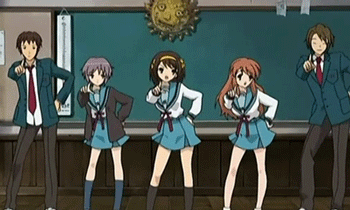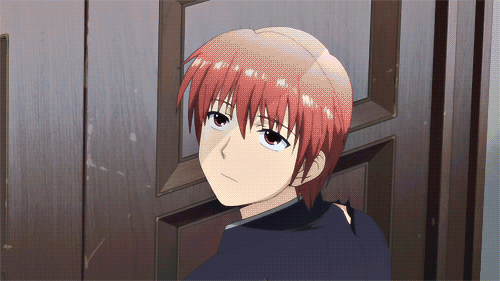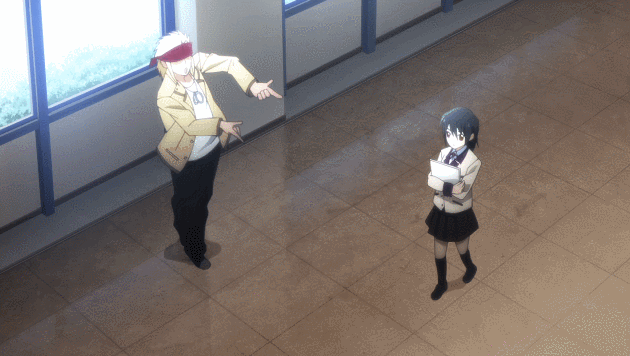This Week in Anime
Crying With Angel Beats 10 Years Later
by Nicholas Dupree & Steve Jones,
Angel Beats is here to break hearts and chew bubblegum, and it's all out of bubblegum. The series is approaching its decade-a-versary and, as Steve and Nick quickly find out, time hasn't put a damper on all of its Big Feelings.
Disclaimer: The views and opinions expressed by the participants in this chatlog are not the views of Anime News Network. Spoiler Warning for discussion of the series ahead.
 @Lossthief
@Lossthief
 @Liuwdere
@Liuwdere
 @A_Tasty_Sub
@A_Tasty_Sub
 @vestenet
@vestenet
Nick
Steve we're closing in on the end of the twenty teens, and with such a momentous occasion I think it's only fitting that we remind everyone ANGEL BEATS IS TEN YEARS OLD.

Steve we're closing in on the end of the twenty teens, and with such a momentous occasion I think it's only fitting that we remind everyone ANGEL BEATS IS TEN YEARS OLD.

Steve
Well, when you think about it, it's really only 9 years and 9 months old, which sounds better. Oh no my back went out.
Well, when you think about it, it's really only 9 years and 9 months old, which sounds better. Oh no my back went out.
Sorry, I don't think the sales tax dodge works for Father Time.
Truth be told, I never actually watched this seminal turn-of-the-decade classic when it aired, but now that it's streaming pretty much everywhere an anime-watching-person would want it, I figured this would be a perfect opportunity to look back and see how far we've come in these ten tumultuous years.
Luckily, some things never change.

Luckily, some things never change.

Angel Beats inhabits a weird place in fandom memory. It was the first real "hit" show of the 2010s, while also being the latest in a line of successful projects by Clannad creator Jun Maeda. But then like 6 months after it aired Madoka Magica happened and became all anyone talked about for like two years. Between that, and Maeda not really having any big projects since then, it's easy to imagine anyone who wasn't around before 2014 or so just never having heard of it.


Time is cruel indeed. As an ancient 31-year-old experiencing it in the Year of Our Lord 2019, Angel Beats feels like the capstone on the Age of Haruhi Suzumiya, a zeitgeist that may as well be as distant as the Cambrian explosion.


Usually I'd say not to utter that dark goddess' name, but it's hard not to see the inspiration for Angel Beats' co-heroine. At least she never dances the forbidden dance.


Yurippe is the most obvious parallel, but what also sticks out is just how much stuff is crammed into Angel Beats. I mean, just talking about the concept alone, it's afterlife high school Limbo where a rogue faction of students uses guns, glaives, and guts to fight a lone angel sentinel and delay their own eventual passing onto the Great Beyond. Also there are rock concerts.


That's right kids, there was once a time where you could have music in a TV anime that wasn't from an idol group. Instead they were the "light music club" and sang songs where you could still hear the bass in the final mix. Angel Beats just kind of throws you right into its high concept from the word "Go". The very first thing that happens is our amnesiac male lead waking up to this

and being told he's been drafted into a guerilla campaign against God because he's dead.

and being told he's been drafted into a guerilla campaign against God because he's dead.
Not quite the heavenly choir. It's worth remembering that Haruhi was, at the time, praised for being genre-defying, and Angel Beats similarly aims to defy genre by swinging for the fences and including a little bit of all of them. And I can't say I didn't feel a little bit nostalgic for this period of throwing narrative spaghetti against the wall and seeing what stuck. There's just something fun about seeing all these wildly incongruous elements rub against each other, and not in necessarily unintentional ways.
Maeda's works have such an overbearing reputation as tearjerkers that, upon revisiting AB, I was shocked to see how much of it is just Looney Tunes.


You know I love me some good ultra-violent slapstick.


The best moment in the entire show is this random side character getting offed by irony during the eyecatch.








And to Maeda's credit, I think he understands as a storyteller how important comedy—even frequently hit-or-miss comedy—is when it comes to writing tearjerkers. Pretty much everyone in this show is a dumb moron who tells bad jokes, but that's part of what makes them endearing in the first place.




For sure, it's just a little bit like visiting an old childhood playground and realizing how small the big slide actually was compared to your memories. But honestly the comedy was the part of this show that worked the best for me. Though it does still sometimes clash to go from people getting Wile E. Coyote'd out of windows to this.




I didn't fully realize what I was in for until the second episode, where an extended string of slapstick deathtraps was immediately followed up by Yuri's backstory, which, uh, escalates quickly.




Ooooookay so I guess we're jumping right into that.
I mean that is true to the Maeda way.
I'll just be up front: while I respect Maeda's heart-on-sleeve writing and his running theme of people bonding over sharing their pain and supporting each other, man do the tragic backstories in AB just not work for me. Some are more effective than others, for sure, but it always feels like each character got one too many cruelly ironic tragedies poured over their head. It starts with Yurippe's younger siblings getting murderized by the world's most trigger happy domestic burglars.


I'd actually say Yurippe's backstory is the one that most egregiously veers into tragedy porn without doing a single thing to earn or justify it. It's just wantonly cruel for no reason other than to weave her insecurity into the fabric of the story, and even then, there's no reason for it to have gone THAT far. It's a shame that's what Angel Beats chooses to start with, because it really sets a sour tone for the rest.
To be clear, I like what the show does with Yurippe's character - I'd argue she's the best part of the whole cast - but the plot mechanics for getting her to where she is at the start of the show are just slapdash.


I also just counted and 4 of the show's female characters have backstories/stories that involve some kind of debilitating illness or paralysis. Not saying they're bad in isolation, but in aggregate that's a pretty revealing statistic for a single show.
In the now, I mostly pick up what this show puts down. But whenever someone starts monologuing a flashback all I hear is
Again, here's where I think the show's sillier and more ridiculous elements are super important, because if the show was JUST those traumas, it would be miserable, and not in the good way. As is, all of these disparate components added up in a way that felt deeply sincere, and that helped stave off some of the eye-rolling aspects that might've taken away from these characters.


Yeah, for all the questionable backstories I think that the characters, as they're written in the A-plot of the show, are pretty well realized and even charming.
Well, most of them.

Well, most of them.

TK is there to be TK, and I think he's a perfectly fine TK. But it is also funny that the cast is very large and half of them don't end up mattering in the slightest.
Yeah, for every character with an emotional arc or fully realized point of view, there's two shmucks there to deliver their running joke before usually getting comedically murdered (don't worry, they get better)

Plenty of those jokes are funny, but there's still a stark separation between Yurippe or Yuzuru and the dude whose only character trait is having bad taste in nicknames.


Plenty of those jokes are funny, but there's still a stark separation between Yurippe or Yuzuru and the dude whose only character trait is having bad taste in nicknames.

I'm sorry to say this so close to Christmas but I loathe the Christ child. Speaking of characters who do get fully realized arcs, however, Iwasawa's story in the third episode is where I finally "got" what Angel Beats was doing. All of the wackiness and sadness coalesced against reason into a show-stopping final scene about finality itself.








It's no Minmay Attack, but as far as showstopping musical numbers go it's pretty solid. And it's where I think AB first really manages to sell the melancholy at the heart of its premise.
It's the first instance of Angel Beats' ace in the hole directorial trick: the way it shows its characters “moving on,” or rather, the way it doesn't. They just disappear between cuts. Acceptance doesn't arrive with fireworks; it leaves with a sigh. It's instant and silent in a way that NEVER failed to punch me square in the gut.
Though perhaps the best part of this scene is that it opens the door for the real star of the show.


We stan an awful pink gremlin





Poetry in motion








Listen all you fetuses out there. You know that Kaguya-sama ED with Chika you like so much? It owes everything to Yui hijacking the Angel Beats opening credits in episode 4.








The experience of going from episode 3's take-no-prisoners emotional climax to...this...was sublime.
Episode 4 is a pretty great swerve after that first climax. You think after that the series will be each character gradually facing their trauma and passing on, and it almost goes that way with Hinata.


But then right as he's about to fulfill his adolescent yearning, Yui the gremlin body slams him to prolong his suffering idyllic high school adventures.



But then right as he's about to fulfill his adolescent yearning, Yui the gremlin body slams him to prolong his suffering idyllic high school adventures.

Yeah, the central conflict of the show is that tension between the knowledge that one has to move on, and these particular misfits' desires to hold onto what they still have (and onto each other—sometimes very literally) for as long as possible. In between the silliness and the tragedy, there's a bittersweet nugget there that ends up sustaining the show for me.
The fear of moving on is perhaps a little understated - the characters only bring it up a couple of times really—but it's also worth noting how many of the characters straight up don't trust this afterlife they've wound up in. Yurippe's defining conflict is that she rejects the idea that whatever force or God decided to let her family get killed would try to "fix" her to get her to go quietly into that goodnight.




I also question the wisdom of whatever creator decided the best way for kids to deal with their unresolved trauma was to make them relive high school ad infinitum.
Everyone knows the best cure for depression is Honors Calculus AB, forever.
If I died and found myself back in high school, my first instinct would definitely not be that I'm in Limbo.
If that ain't the Bad Place, I don't know what is.
If that ain't the Bad Place, I don't know what is.
I also question whoever decided the best course of action was to throw a bunch of emotionally scarred teenagers into a school with no supervision or real guidance. Do you want solipsists? This is how you get solipsists.




I'm glad fascist hypnotist Shinji Ikari mellowed out after, like, one episode. Seriously, he goes from massacring the entire school, to getting yet another sad backstory, to this

in record time.

in record time.
We find out he's been playing Secret Hitler for the whole show, he brutally kills every character but Yuzuru and Angel, tries to mindbreak Yurippe into passing on against her will, dumps his tragic backstory, and hugs it out with our protagonist before just becoming another comic relief. It's almost impressive.


I'd be lying if I said it didn't extract some tears out of me! Even though I've voiced some of my issues with the show's decisions and construction (and I certainly have more), on a visceral level, it tends to work more often than not. Clearly its popularity speaks to the fact that it touched plenty of people similarly. Despite its absurd commitment to changing itself up nearly every episode, it does know what it's doing on some level.
Eh, Ayato's introduction (and subsequent demotion to comic relief) feels like the biggest miss in AB. It's interesting in theory, but in execution is too rushed and sandwiched between too much other stuff for me to really care. Doesn't help that it's followed up with Yuzuru's backstory which feels a lot more thought out.
Oh for sure, but I think even the show's misses have these fleeting moments that work in spite of themselves. On the other hand, Angel Beats might've just been a good reminder that I'm big ol' sap when you get down to it. Which I'm willing to cop to.
Writing stories for saps is Maeda's bread and butter, frankly, and when it works it works pretty well, even if I find it a little distancing how Yuzuru and "Angel" take it upon themselves to become every other character's unsolicited grief counselor.




True, but it gave us this scene, and I'm not one to look a gift horse in the mouth.








Again: Yui is the best. Also she should be allowed to supplex God at least once.


Better do it twice for good measure.
That or hit him with a bat

That or hit him with a bat

No I think the audience is the one that gets hit with a bat. Especially with how Yui's story plays out. Turns out she can hijack the ending credits too!




God that whole just becomes more and more laser-focused on turning the audience into a mob of leaky faucets. Blatantly manipulative, but I have to respect the sincerity of Maeda's commitment to his own style.
Like you mentioned, it's a bit much how nearly every girl in this show has some debilitating illness or disability, but at least in the moment it's wonderfully bittersweet to see Hinata, the resident dipshit who spends the whole show getting into fights with her, assure Yui that no matter what her next life is like, she'll always be deserving of love and happiness.
Like you said, when it works it works, and here it most certainly worked. On my tear ducts.


Though I do have to laugh at the grand canyon of difference between Yui's goodbye and uhhhhhhh nearly everyone else's.




Goodbye nameless band girls who never got a sad flashback! And goodbye equally nameless background characters!




Goodbye nameless band girls who never got a sad flashback! And goodbye equally nameless background characters!
Look, when you've got a cast of 50 and some of them have had two lines of dialogue, if that, you gotta cut some corners. And since we're getting close to the end now, we gotta talk about the name of the show.
Oh jeez, yeah. So the title of Angel Beats is something that probably seems trite in this day and age. But let me assure folks this reveal was huge back in 2010.


Somehow I knew I could count on you to just make the worst possible thing. Thank you.
Look the sound quality might be lacking compared to Bose but you have to admit that solid red looks fresh.
But genuinely, I knew pretty much nothing about the plot, so the way this last-minute reveal unfolds out of NOWHERE just sent me. Goddamn Angel('s) (Heart)Beats (That Used to Belong to Yuzuru But Because He Became An Organ Donor At The Last Minute He Prolonged The Life Of This Girl Who Became An Afterlife Prefect Who He Fell In Love With Despite Knowing Nothing Of This)! It is SO wild and I SO did not care about that wildness in the moment because everything beforehand was just too emotionally overwhelming and I was just going with the flow at that point.
It is, on its face, absolutely ridiculous. It's the "cry every tiem" copypasta made flesh. And yet somehow it works entirely because Maeda has never heard of irony in his life and goes forward with it like a battering ram.








Angel Beats is dumb on a deeply sincere level, and that's ultimately why it succeeds. Tho I do have to credit Maeda for throwing us this bone a few episodes prior, which I only noticed when going back through my screencaps.




I think that sums up Angel Beats about as well as you can. It has its faults, and certainly after a decade some parts of it are showing their age, but it's an intensely earnest story that cares for its characters just as much as it wants the viewer to. And in the end it's not afraid to ask the important questions:


Yeah, I'm glad I finally took the time to watch it. It feels of its time, but in a way I wouldn't want to change in the slightest. And furthermore, it reminded me of the most important lesson of all



discuss this in the forum (28 posts) |